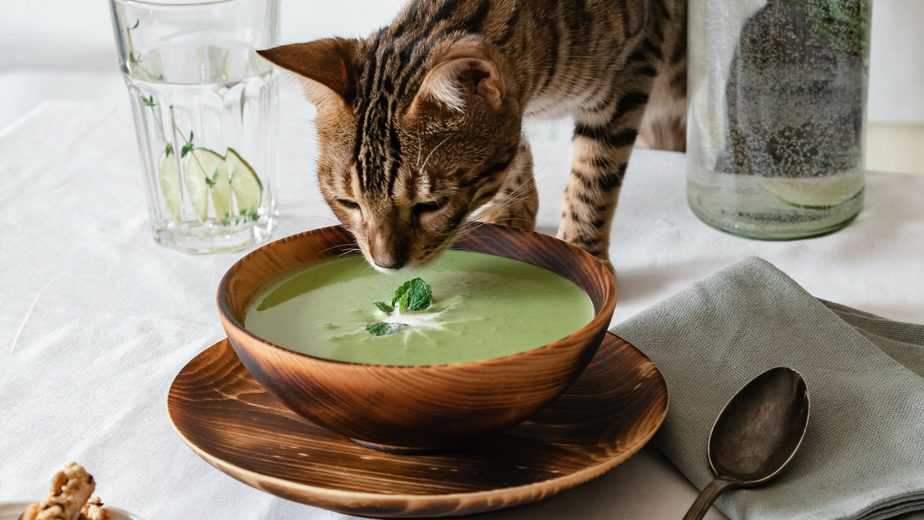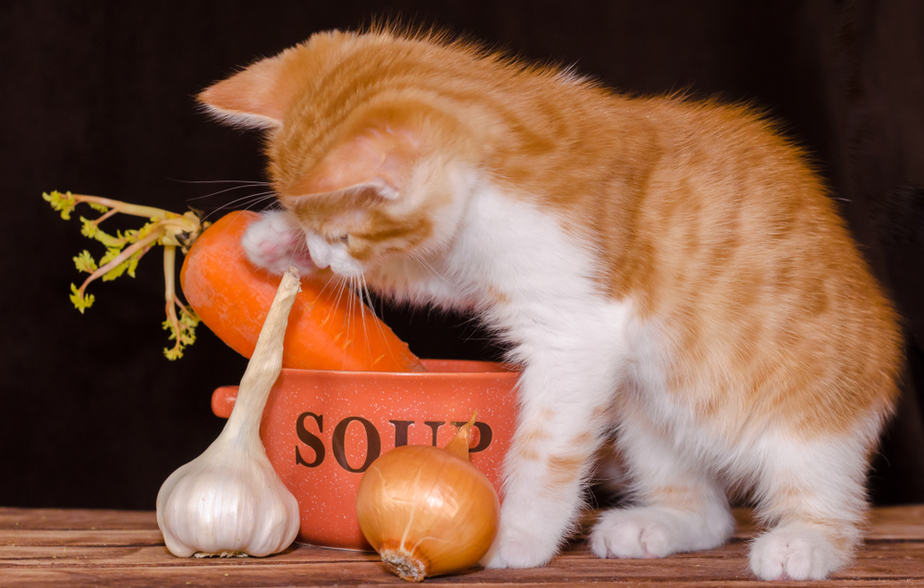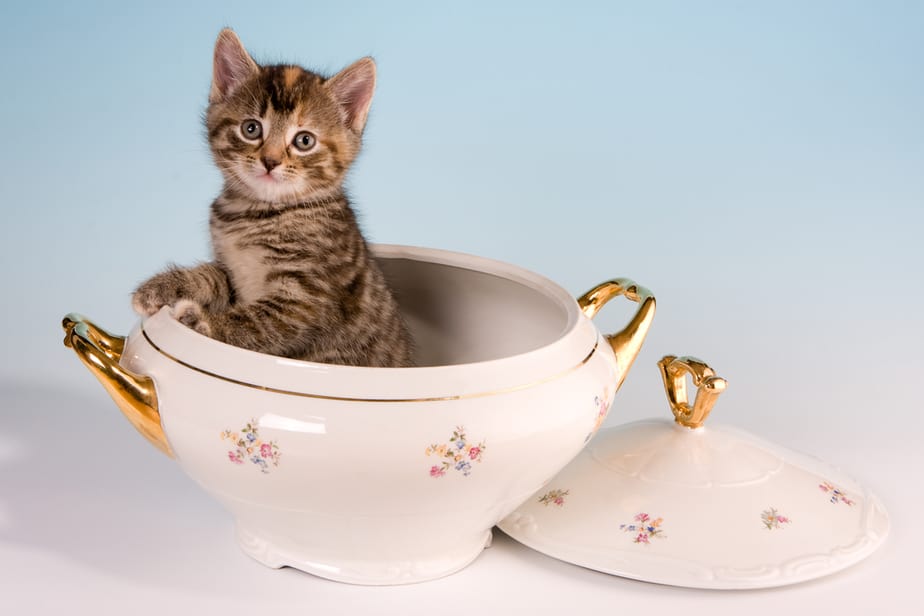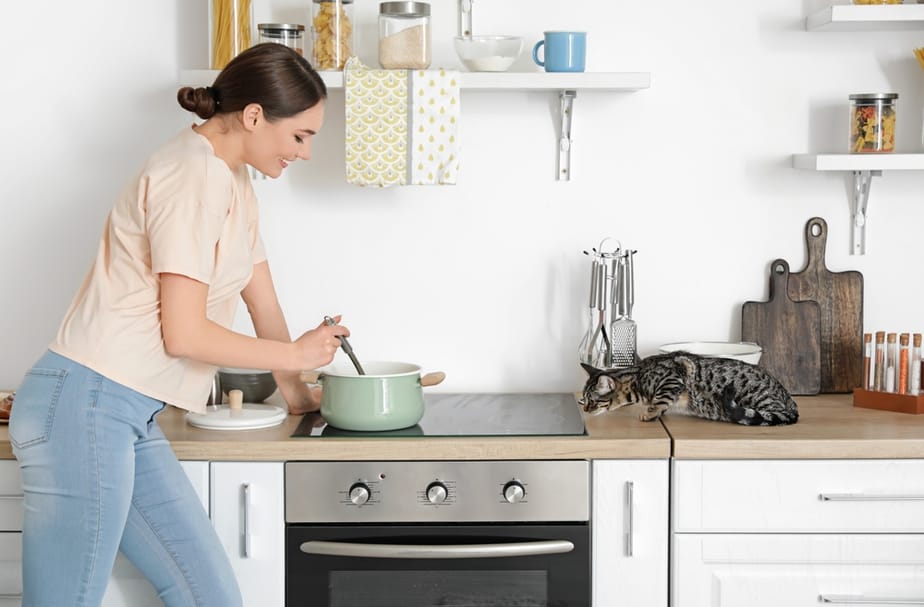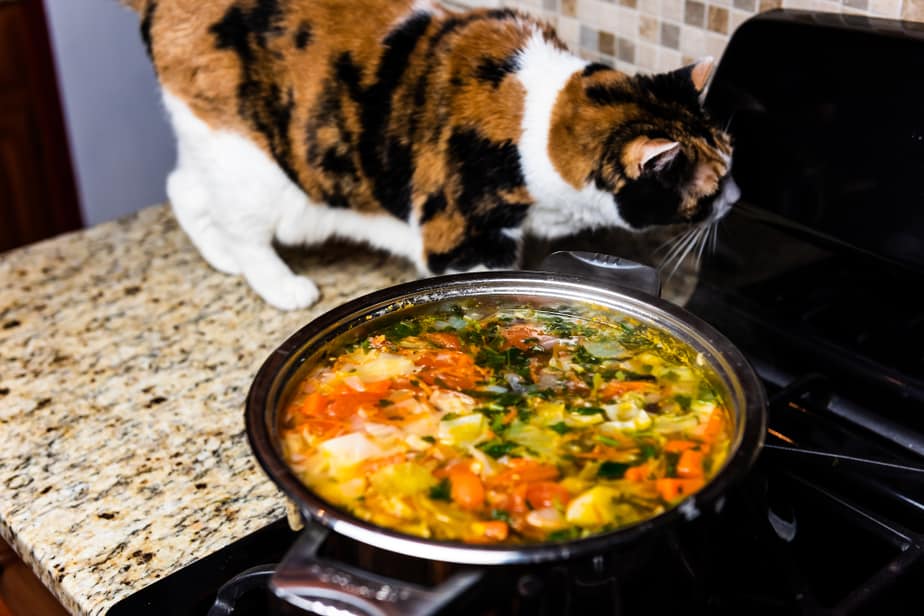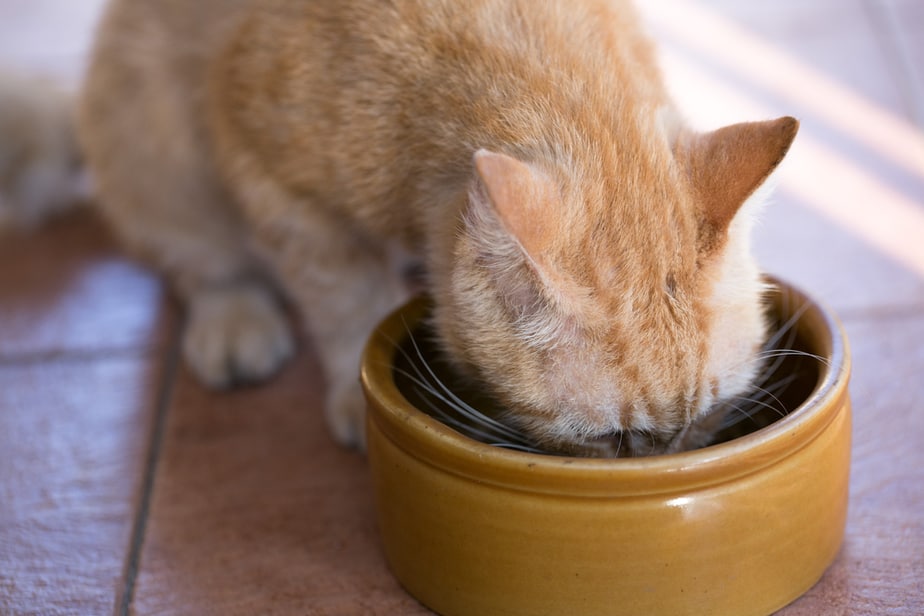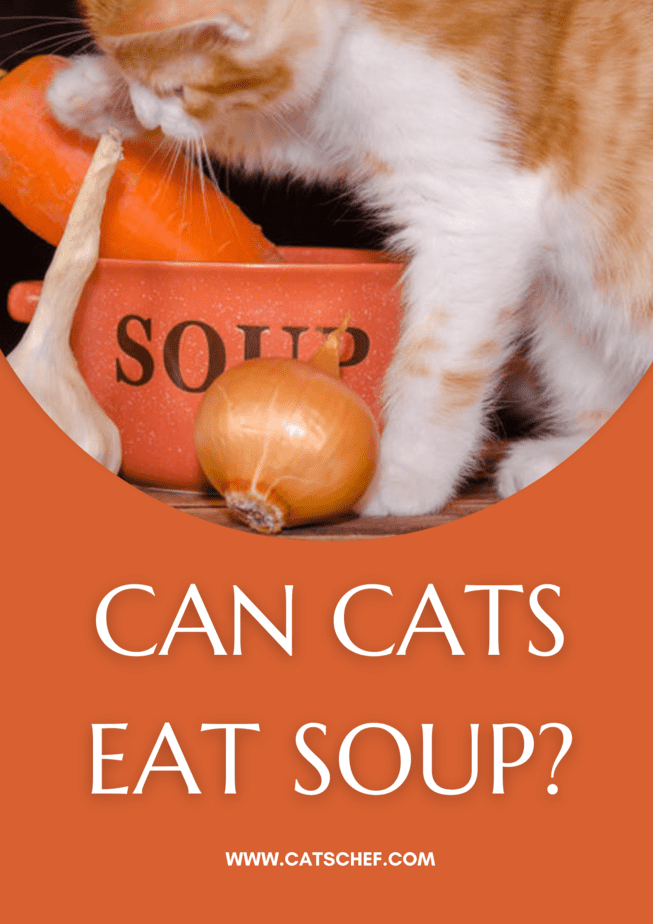📖 Table of Content:
Can cats eat soup? Your pet may have the flu and you’re thinking of all the possible ways to help her get better.
Do you remember how your mom used to cook soup for you all the time? However, you never saw a vet offering cats hot soup when they’re sick!
There are many kinds of soup all over the world. They’re popular in many cuisines and each culture has a different point of view on this meal. Soup is generally considered healthy and is available in many grocery shops, too.
Another good thing about soup is that you can make it yourself and choose the flavor you want! If cats can eat soup, does this mean we should use it to treat their cold?
Can cats eat soup? Is it healthy for them?
Soup can be made from just about anything. This is great for humans, but the endless choices could be risky for our furry companions.
We know humans and felines are built differently. Because of this, there’s always a risk that your cat will have a negative reaction to human foods. Especially because our cuisines are a lot richer in spices, condiments, sauces, and others.
Cats are rather simple and require a meat-based diet. So, soup can be healthy or harmful for cats depending on its ingredients. Some kinds of soup can be quite beneficial, whereas others may be quite detrimental to your pet’s health.
What is a soup made of?
We all know soup is a liquid food and is usually served hot. While you may have burned your tongue a couple of times, the taste made up for it. This makes you think cats can eat soup without any trouble, right?
Well, there’s more to soup than just warm water. This dish is famous for its versatility, and because it can be made from almost anything. Usually, it’s a combination of meat, vegetables, and spices.
1. Meat
Cats are carnivores who require a high protein diet on a daily basis. Our furry pals need to consume a lot of nutrient-dense food in order to have enough energy to live all nine lives contentedly.
Meat is the best way to fulfill their dietary requirements and keep them healthy and happy. Chicken is one of the nicest treats you can offer your cat because it’s high in protein – your pet will love it!
Remember, however, that you must properly prepare it to avoid any digestive issues. Chicken can be consumed if properly cooked, without any seasonings. Raw meat always poses a threat to your cat’s health because of the bacteria it carries.
Raw chicken has germs that can cause a variety of dangerous illnesses. If the meat they consume is tainted with bacteria, cats can acquire food poisoning. You can get rid of the bacteria and parasites by cooking the chicken in boiling water.
The bacteria most frequently found in raw meat are listeria, vibrio, clostridium, and salmonella. These bacteria can cause nausea, upset stomach, diarrhea, and vomiting, to name a few symptoms.
Properly cooked chicken is one of the best protein sources for felines, just like lobster. Cats need animal-based food to survive and thrive. Other nutrients are beneficial, but protein is essential.
Cats can’t develop and will become unwell rapidly if they don’t get enough animal protein. Other proteins generated from plant materials may be beneficial to your cat’s health, but they will not be as effective as proteins that come from meat.
Cats’ digestive systems aren’t designed to break down plant matter, so they have a hard time absorbing all of the nutrients.
2. What about veggies?
Vegetables have a wide range of health benefits for humans and cats alike. However, keep in mind that these shouldn’t be your pet’s primary source of nutrition, nor should they be used to substitute the meat she requires on a daily basis.
It doesn’t rule out the possibility of her having veggies as a snack. For example, beans are an excellent kitty food packed with protein, especially if you want to include some greens in her diet.
Other veggies like green peppers are loaded with vitamins and fiber that are essential for your pet’s health.
But some vegetables, like those from the nightshade family, should be avoided. These include eggplant, tomatoes, and potatoes.
Unfortunately, some veggies like these just aren’t suitable for our furry friends and could do more harm than good. That’s why you need to do thorough research before deciding on treating your kitto with greens!
3. Are spices bad for cats?
The short answer is yes, spices can be bad for cats. Salt, black pepper, garlic, and other spices frequently found in human foods, can be detrimental to a feline’s health.
For example, excessive amounts of salt could lead to sodium poisoning. Felines need small amounts of sodium to keep them going, but anything more than a teaspoon could be harmful.
The same goes with black pepper that’s also used as a cat deterrent. Its strong smell is repulsive to cats and you don’t need to worry about her eating it.
The amounts you put in the soup are unlikely to cause harm to your furkid. Still, you should always make the soup without these ingredients and add some to your plate later. That way, both you and your furbaby can enjoy some hot soup.
When it comes to garlic, it’s highly poisonous to felines and you should avoid it as much as possible. Garlic, onions, chives, and other members of the Allium family cause your pet to lose her red blood cells.
This could eventually lead to various types of anemia that could be fatal for your feline. Therefore, stick with small amounts of salt and black pepper – without any traces of garlic!
Can cats eat mushroom soup?
This is a topic where some people vote yes, but others are strictly against it. The reason behind this is that some mushrooms are toxic to felines.
Not all mushrooms are, but is it really worth it? Besides, there are many kinds and flavors out there!
1. Mushrooms
Mushrooms are loved by many around the world and they can be prepared in various ways. However, felines and mushrooms don’t mix well.
As a result of eating mushrooms, your cat may experience diarrhea and vomiting, as well as dehydration and weakness. Depending on the severity of these symptoms, you may need to take her to a veterinarian.
It’s unlikely that a house cat will ever come across mushrooms, but who knows! A few seconds of her alone time with unattended mushrooms could lead to a disaster.
Some mushrooms contain toxins that affect your cat’s liver and kidneys. Fatigue and overall weakness will be the first tell-tale signs.
In rare cases, your pet may experience tremors, hallucinations, disorientation, and seizures. So, it’s better to be safe than sorry, and make sure to remove the mushrooms from any spots accessible to your cat!
2. Other ingredients
Cats can eat soup if the ingredients are suitable for their consumption. However, this isn’t the case with mushroom soups. Besides mushrooms, this type of soup contains butter which is another ingredient that isn’t recommended for felines.
It’s packed with salt and highly saturated fats that are detrimental to your cat’s health. Mushroom soup also contains garlic, onions, and various spices harmful to cats.
Can cats eat chicken noodle soup?
Your pet may have been eyeing your dinner which makes you wonder Can cats eat soup; and if so, what kinds? I know it’s a hard task resisting that sweet, innocent look on her face, but chicken noodle soup might not be the best choice for her.
Yes, it does contain chicken which is good, but it isn’t reason enough to proceed to feed your cat this meal. Some other ingredients like noodles, spices, and veggies are what make chicken noodle soup a no-no for cats.
Noodles are carbohydrates that your cat doesn’t need. Overdoing it on these nutrients can result in poor digestion and a few extra pounds. Unless she’s underweight, your fluffball doesn’t need the extra chunk.
If you don’t reduce your cat’s carb intake, she may develop a number of health problems. Obesity, tooth decay, and diabetes have all been linked to the overconsumption of this nutrient.
Chicken noodle soup is no different than other soups when it comes to meat and spices. Chicken is an excellent source of protein and vitamins for cats, but spices ruin the whole thing!
Garlic, black pepper, onions, and chives make this delicious soup poisonous to cats. Besides, vegetables aren’t on the top of the list either since plant material is harder for them to digest.
Even though noodles and veggies are cooked, it could still be troublesome for your pet to digest them properly. Maybe cook the soup and feed your kitto the meat while you opt for the more vegan part.
Can cats eat chicken broth?
Yes, cats can eat chicken broth. It adds an excellent flavor to chicken noodle soup and if unseasoned, could benefit your cat.
Because it’s made of meat and bones simmered on a stove, it’s high in protein. This nutrient is responsible for your cat’s growth and development, healthy bones, and properly functioning muscles and nervous system.
Meat contains essential amino acids felines require in their diet. It’s a great source of taurine, one of the most important nutrients for cats. Taurine supports their metabolism and boosts the immune system.
Next to taurine, chicken broth is abundant in collagen. This protein is responsible for joint and skin health. Collagen is particularly advantageous to elderly cats since it helps prevent cartilage and bone loss, and reduces joint inflammation.
What about potato soup?
We know the relationship between cats and veggies. When it comes to potatoes, things aren’t very different. Potatoes are a member of the Nightshade family and are potentially dangerous to felines.
The members of this family share a common alkaloid – solanine. When potatoes turn green, for example, they contain more alkaloids and have a bitter taste.
This is also why the majority of people recommend tossing sprouting potatoes. Green potatoes can make your cat sick, causing nausea and diarrhea in her stomach. Side symptoms such as a fever or a headache are also possible.
Similarly, eggplant is hazardous to your cat since it contains large levels of this alkaloid.
Final thoughts
To sum up, can cats eat soup, the short answer would be yes. In small amounts, soup can be great for your pet on occasion. The only concern when it comes to these liquid foods is the ingredients, and spices that can be poisonous to felines.
While chicken gets the green light, mushrooms could be a potential hazard to your pet’s health. When making homemade soup, make sure you stay away from spices and seasonings.
Related post: Can Cats Eat Tomato Soup? You’ll Be Souprised!
